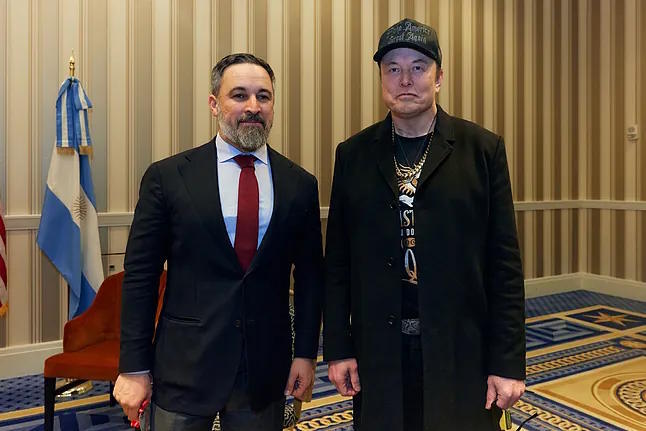Exactly one month had passed since his last visit to Washington. Back then, Santiago Abascal traveled to attend Donald Trump's inauguration, where he boasted of being the only Spanish leader invited and celebrated having the new American president as an "ally," "partner," and "comrade in arms." He believed that aligning with Trump would also "catapult" him in Spain. However, thirty-one days later, the leader of Vox returned to the American capital yesterday after weeks in which Trump's decisions and actions have put his party in a very uncomfortable position. Party leaders had been balancing to maintain their unwavering support for Trump despite the tariff threat and the American stance on Ukraine, and yesterday Abascal reaffirmed his clear choice: the American president.
Yesterday, Vox's leader reiterated his role as a speaker at the Trumpism summit that, exactly a year ago, gave him the first and only photograph he has with the Republican. Just attending this event already indicated that the party intended to maintain its allegiance to Trump despite the controversies and contradictions that this "alliance" has brought, but Abascal took advantage of his speech to reaffirm it.
The meeting was marked by the uncomfortable position in which Vox finds itself due to the recent moves made by the American president regarding the Russian invasion of Ukraine. Last Wednesday, his American "partner" referred to Volodymyr Zelensky as a "dictator" and accused Ukraine of starting the war, words that the Spanish leader avoided mentioning in his speech in Washington, aware that this is a contentious issue within Vox, which had always claimed to be on the side of the aggressed country. Dodging this point of contention and thus showing his intention not to confront Trump, Abascal focused his criticism on the European Union, championing this thesis where he does coincide with his "ally."
Vox's leader then listed a series of accusations directly targeting European politicians as responsible for the Russian invasion. "European Popular and Socialist parties have financed Putin's war," he stated, and continued: "They intend to lead us to total war, the same ones who have left Europe defenseless, destroying its industry and its energy-generating capacity." Abascal went even further, blaming EU politicians for having "facilitated Putin's aggression" and "given Russia the opportunity to invade Ukraine."
Abascal thus avoided commenting on Trump's stance on this matter, without indicating any disagreement with his "partner." On the contrary, the only reference he made to the American president in this regard was positive: "[European politicians] are the same ones who laughed when Trump, eight years ago, warned Europe that it was putting itself in Russia's hands by renouncing fossil fuels." Abascal thus tied his future to that of the Republican and led the direct confrontation with Europe that his "ally" had initiated: "We must get rid of those armchair Napoleons who only know how to provoke wars whose consequences others pay for," declared the Spanish leader.
However, despite Abascal avoiding addressing Trump's actions that clash with his party's beliefs - which had always advocated for standing by Ukraine - these discursive discrepancies are very much alive within the party. So much so that in recent days, some leaders have openly opposed the movements of the American president.
Euro MP Hermann Tertsch, who accompanies Abascal on his trip to Washington, criticized Trump for calling Zelensky a "dictator," words he saw as "the first major blot" on the Republican and an "unnecessary diatribe" against the Ukrainian. Tertsch stated, "There is an undeniable truth that Trump cannot ignore: Zelensky is the elected president, while Russia is indeed a dictatorship." The opinion of Tertsch - one of Vox's most vocal supporters of Ukraine - was echoed by Vox MEP Juan Carlos Girauta, although shortly after, they both claimed that their agreement with Abascal's international policy "is absolute."
Privately, within the party, they refrain from speaking out against Trump's actions regarding this issue, trusting that the American will not sign a peace agreement that does not consider Ukraine's voice - despite the initial actions of the American president pointing in the opposite direction. However, sources within Vox's leadership acknowledge that, "if Trump truly ends up negotiating with Russia without Ukraine," their stance must be clear: "We have to say, and we will say, that it is wrong."
The internal criticisms that Abascal's party has been facing in recent weeks - accompanied by a trickle of resignations and departures - are based on the "shift" that, they believe, the party has taken in its stance regarding the Russian invasion since joining forces with Hungarian Viktor Orban in Europe. Those who were once part of Vox's leadership now condemn the party for "buying into the entire discourse" of the American president and point out that this shift "is making people increasingly distant." "They would have aligned with Trump no matter what he said about Ukraine," laments a former leader, noting that within the party, "there are voices demanding explanations."
Criticisms within Vox regarding the alliance with the Republican do not only come from that angle but also from the lack of condemnation of his tariff intentions. Abascal once again excused his "partner" yesterday: "The real burdens on our economy are not the tariffs announced by the US, but the Green Deal and taxes."
